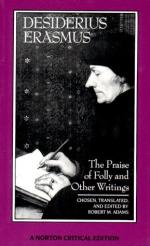
|
| Name: _________________________ | Period: ___________________ |
This test consists of 15 multiple choice questions and 5 short answer questions.
Multiple Choice Questions
1. How does Folly claim she is delivering her speech?
(a) With great emotion.
(b) Quickly.
(c) With intentionality and serious thought.
(d) Extempore, or unprepared.
2. By Stoic definition, what does folly mean?
(a) Given to frivolity.
(b) Belonging to women.
(c) Without wisdom.
(d) Moved by the passions.
3. Erasmus complains that many people find jokes against popes and princes more offensive than what?
(a) Perjury.
(b) Murder.
(c) Sarcasm.
(d) Blasphemy.
4. How did Folly begin life?
(a) Crying.
(b) Smiling sweetly.
(c) Deviously.
(d) Running and jumping.
5. What is unknown in the place of Folly's birth?
(a) Toil, old age, and sickness.
(b) Youth, immaturity, and pain.
(c) Gardens.
(d) Harsh words or war.
6. Folly is in poor repute even amongst whom?
(a) The learned.
(b) Madmen.
(c) The noblemen.
(d) The greatest fools.
7. What does Folly state is necessary for friendship?
(a) Honesty.
(b) Folly.
(c) Reason.
(d) Wisdom.
8. Orators prepare long speeches to do what Folly does with her what?
(a) Looks.
(b) Speech.
(c) Riddles.
(d) Laughter.
9. Whom does Folly consider more foolish than men?
(a) Nymphs.
(b) Animals.
(c) Gods.
(d) Women.
10. Erasmus marvels that present-day ears can bear to hear only what?
(a) Music.
(b) Serious prose.
(c) Honorific titles.
(d) Pedantic poetry.
11. According to Folly, who would be disagreeable and disliked if not graced by her divine powers?
(a) The Sophists.
(b) The nobility.
(c) The Stoics.
(d) The gods.
12. Folly states that not wanting more than your share of wisdom is a true sign of what?
(a) Stupidity.
(b) Folly.
(c) Reverence.
(d) Prudence.
13. According to Folly, who shows the way to perfect wisdom?
(a) Wisdom.
(b) Flattery.
(c) Folly.
(d) Ignorance.
14. In which year did Erasmus date his Prefatory Letter?
(a) 1500.
(b) 1550.
(c) 1508.
(d) 1598.
15. Erasmus states that his praise of folly has not been altogether what?
(a) Welcomed.
(b) Wasted.
(c) Foolish.
(d) Criticized.
Short Answer Questions
1. To whom did Erasmus dedicate The Praise of Folly?
2. What calmed a violent Roman mob?
3. Erasmus believes he is not writing sarcasm, but what instead?
4. According to Erasmus, nothing is more entertaining than treating what in such a way as to make it clear you are doing anything but trifling with them?
5. Which poet wrote, "For ignorance provides the happiest life"?
|
This section contains 348 words (approx. 2 pages at 300 words per page) |

|




